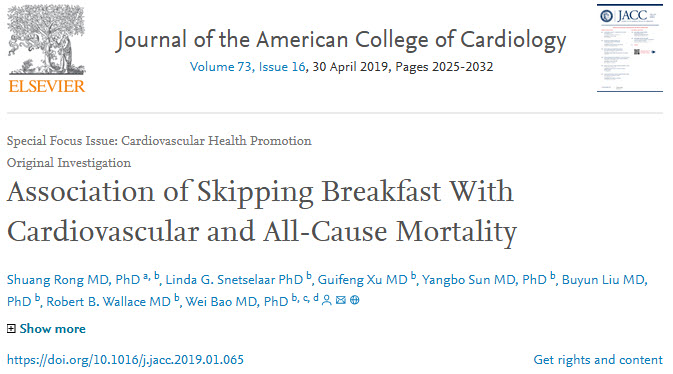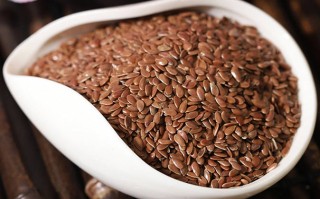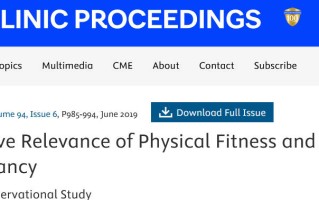一日之计在于晨,一顿有营养的早餐,能给我们饿了一晚上的身体充上电,让我们在新的一天里充满活力。不过,随着生活节奏的加快,赶着上班上学的年轻人中,越来越多人的早餐就是在路上随便吃两口,甚至干脆不吃早餐,这可对身体健康没啥好处。
武汉科技大学与爱荷华大学的Shuang Rong和Wei Bao等对6550名美国人的调查就发现,相比每天吃早餐的人,从不吃早餐与心血管死亡风险升高87%,全因死亡风险升高19%相关。该研究发表在JACC上[1]。这也是首次前瞻性地证明了不吃早餐与较高的心血管死亡率有关。

俗话说早餐要吃好,午餐要吃饱,晚餐要吃少。早餐作为一天中的第一顿饭,重要性是不言而喻的,毕竟对于大多数人来说,早餐前已经有10多个小时没吃饭了,急需补充能量。不过早餐也往往是时间最为紧张的一餐,人们起床后要赶着上班赶着上学,更有甚者,为了早上多睡会懒觉,干脆就不吃早餐了。比如在美国,就有23.8%的年轻人,日常不吃早餐[2],在中国经济较为发达的华南地区,也有19.6%的人很少吃早餐,而身体还在发育中的小初高的学生,也分别有3%、7.6%和6.6%不吃早餐。
不吃早餐可不只是要饿一上午那么简单,还会影响食欲,让下一餐吃的更多[5],造成肥胖[6],乃至降低胰岛素敏感性[7],对工作效率也有不利影响[8]。此外,不吃早餐还会激活下丘脑-垂体-肾上腺轴,让血压升高[9],并与较高的总胆固醇和低密度脂蛋白胆固醇水平有关[10]。有了这么多心血管危险因素,不吃早餐的人也确实有着更高的心血管风险,患冠心病、卒中等的风险都要高于吃早餐的人[11,12]。
不过得了病还有的治,还是看看对死亡率的影响吧。Shuang Rong和Wei Bao等利用美国全国健康与营养检查调查的数据,对早餐与心血管死亡和全因死亡之间的关系进行了调查。
研究共纳入了资料完整,在基线时没有心血管疾病的6550人的数据。他们平均年龄53.2岁(SE±0.3),48%是男性。这些人中,有336人(5.1%)从不吃早餐,713人(10.9%)很少吃早餐,1639人(25%)有时吃早餐,3862人(59%)每天吃早餐。在中位18.8年,总共112148人年的随访中,共有2318人死亡,其中619人死于心血管疾病。在排除了年龄、性别和种族的因素后,研究人员发现,不吃早饭与全因死亡风险提高75%、心血管死亡风险提高158%有关。进一步排除基线时身高体重血压,以及家庭收入和生活方式的影响后,不吃早餐依然与全因死亡风险升高19%、心血管死亡风险升高87%有关。
具体到心血管疾病的种类上,卒中和不吃早餐的关系最为密切。排除全部影响因素后,不吃早餐与卒中死亡风险升高239%有关。而不吃早餐与心脏病死亡的关系,在排除了全部影响因素后不再显著。
不吃早餐与心血管死亡、全因死亡、卒中死亡风险升高有关。论文通讯作者Wei Bao表示:“多年来,卫生保健提供者和饮食专家都知道每天吃早餐的重要性,清晨的卡路里会加速身体的新陈代谢,为人们提供一天开始所需的能量和营养。但是,尽管有证据表明不吃早餐会增加肥胖、高血压、2型糖尿病等的风险,但很少有人说他们把吃早餐列在他们的日程里。”
希望这项研究能让更多的人重视起早餐。
参考文献:
1. Association of Skipping Breakfast With Cardiovascular and All-Cause Mortality[J]. Journal of the American College of Cardiology, 2019, 73(16): 2025-2032.
2. The relationship of breakfast skipping and type of breakfast consumed with overweight/obesity, abdominal obesity, other cardiometabolic risk factors and the metabolic syndrome in young adults. The National Health and Nutrition Examination Survey (NHANES): 1999–2006[J]. Public health nutrition, 2013, 16(11): 2073-2082.
3. Associations between breakfast eating habits and health-promoting lifestyle, suboptimal health status in Southern China: a population based, cross sectional study[J]. Journal of translational medicine, 2014, 12(1): 348.
4. Survey of breakfast behaviors among primary and secondary students in seven cities of China[J]. Acta Nutrimenta Sinica, 2010, 32(1): 39-46.
5. Breakfast consumption affects appetite, energy intake, and the metabolic and endocrine responses to foods consumed later in the day in male habitual breakfast eaters[J]. The Journal of nutrition, 2011, 141(7): 1381-1389.
6. A prospective study of breakfast consumption and weight gain among US men[J]. Obesity, 2007, 15(10): 2463-2469.
7. The relationship between breakfast skipping, chronotype, and glycemic control in type 2 diabetes[J]. Chronobiology international, 2014, 31(1): 64-71.
8. Breakfast: a good habit, not a repetitive custom[J]. Journal of international medical research, 2008, 36(4): 613-624.
9. Female breakfast skippers display a disrupted cortisol rhythm and elevated blood pressure[J]. Physiology & behavior, 2015, 140: 215-221.
10. Skipping breakfast: longitudinal associations with cardiometabolic risk factors in the Childhood Determinants of Adult Health Study[J]. The American journal of clinical nutrition, 2010, 92(6): 1316-1325.
11. Prospective study of breakfast eating and incident coronary heart disease in a cohort of male US health professionals[J]. Circulation, 2013, 128(4): 337-343.
12. Association of breakfast intake with incident stroke and coronary heart disease: the Japan Public Health Center–Based Study[J]. Stroke, 2016, 47(2): 477-481.
标签: 心血管





